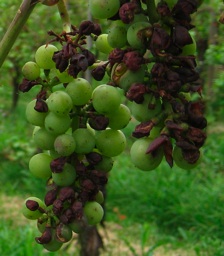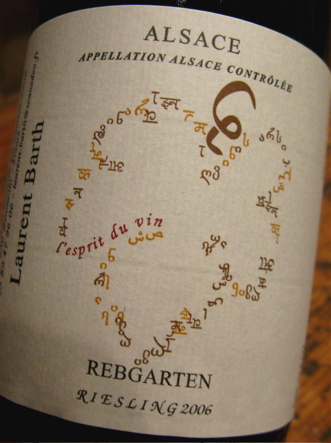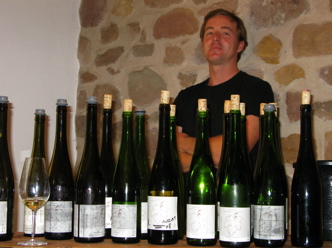
: Alsace wine producer: Laurent Barth, Bennwihr
In 2009, during my first visit to Laurent Barth, it is 10 years since he began building up his own small-scale, organic, and highly appreciated domaine. For over 12 years, young Laurent had worked in vineyards in France, South Africa, USA, Australia and - lo and behold - India (which is revealed if we look carefully at the label)
Returning 1999 shall be the time to take over the cultivation of the family's only 3.5 have vineyards. Until 2003, he was bound to deliver the entire crop to the large co-operative across the street - Bestheim. As the delivery requirements have decreased his own production has risen. The demand for Laurent's wines is very strong, and he is highly classified by, for example, La Revue du Vin de France. Despite the positive publicity and the minimal production, the ratio of quality to price is remarkably low.
The area has increases slowly and includes a small parcel on the Grand Cru Schlossberg. This plot was planted with Riesling with very high density, as much as 11 000 vines per hectare. A large share of the vineyard is on the Grand Cru Marckrain. Marckrain is a Grand Cru which used to be totally dominated the Bestheim. Fortunately, this promising terroir ha been revived thanks to young talented producers, in addition to Laurent Barth also Fabien Stirn, Etienne Simonis, Jean-Léon Schoech and Michel Fonné (Barth René).
 The year 2007 brought a disaster to the villages Bennwihr, Sigolsheim, and Mittelwihr as hail destroyed up to 90% of the grapes in some vineyards. Laurent Barths wines from 2007 are largely from grapes bought from other growers, either "solidarity grapes" or grapes bought on root during the month of July. Despite these problems, Barth has in an impressive manner succeeded in creating an excellent collection of superb 2007s with stunning qualities and terroir characteristics.
The year 2007 brought a disaster to the villages Bennwihr, Sigolsheim, and Mittelwihr as hail destroyed up to 90% of the grapes in some vineyards. Laurent Barths wines from 2007 are largely from grapes bought from other growers, either "solidarity grapes" or grapes bought on root during the month of July. Despite these problems, Barth has in an impressive manner succeeded in creating an excellent collection of superb 2007s with stunning qualities and terroir characteristics.
Laurent Barth is a bit of cult. The quality is remarkably consistent, but each one carries a creative and idea which that makes them very engaging and personal. Great stuff!
Last visit: 2009.

Facts
laurent.barth@wanadoo.fr
Riesling Rebgarten €9
Lieux-dits: Rebgarten
